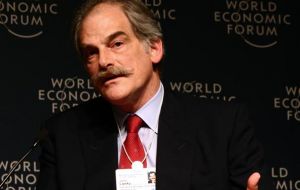MercoPress. South Atlantic News Agency
Insurance levy on banks to protect tax payers pockets
 IMF deputy managing director John Lipsky has to work out details for next April G-20 meeting.
IMF deputy managing director John Lipsky has to work out details for next April G-20 meeting. An insurance levy on financial institutions to help bail out banks in any future financial crisis has been backed at the World Economic Forum. Politicians and bankers have expressed support for the idea, while the International Monetary Fund (IMF) has described it as “practical”.
The levy would go into a fund which could be used to bail out the banks instead of taxpayer money.
Governments across the world have spent billions of dollars saving banks.
The insurance levy is seen by many as a more realistic option than a tax on financial transactions, often referred to as a “Tobin Tax”, which has been discussed but has proved unpopular in some quarters.
The tax has been proposed by the UK and France, but has garnered less support in the US.
The insurance levy is seen as a more workable solution, not least because it has been backed by some leading bankers.
Josef Ackermann, chief executive of Deutsche Bank, has advocated what he called “a European rescue and resolution fund”, while Barclays head Bob Diamond has supported the idea of a global levy.
The leader of the opposition in the UK, David Cameron, has also backed the proposals.
“We would work for a new international levy on banks to protect the taxpayer from footing the bill for banking crises,” he said during a speech in Davos.
Such a levy is one of a number of options being outlined by the IMF that will be presented to G20 ministers in April.
However, working out the details of such a scheme could prove difficult, said the IMF's deputy managing director John Lipsky.
“You need some sense of how to define the risk you're trying to insure,” he said.
The US government has already proposed a tax on big banks to try and recoup some of the taxpayers' money spent through its 700 billion US dollars bail-out program.
Governments across the world are also trying to push through changes to banking regulation to try and prevent future financial crises happening in the first place.
Earlier this month, US President Barack Obama outlined far-reaching reforms of the banking sector, including limits on the size of banks and restrictions of some risky trading practices.




Top Comments
Disclaimer & comment rulesCommenting for this story is now closed.
If you have a Facebook account, become a fan and comment on our Facebook Page!